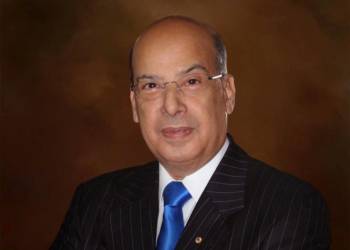By Sir Ronald Sanders
Readers of Barbados newspapers were exposed recently to the views of John Beale, one of the country’s former ambassadors to the Organisation of American States (OAS), on the forthcoming election for the post of secretary-general. Beale served at the OAS and did sterling work, his views on the secretary-generalship of the OAS deserves attention.
Beale is my friend and former colleague as ambassador to the United States of America (US) and the OAS. We fought several battles together to advance the interests of the Caribbean Community (CARICOM) countries in the US and at the OAS. At a bilateral level, we jointly took on the abuse by the US Virgin Islands (USVI) government of US Federal government tax rebates to disadvantage CARICOM rum exporters. The USVI used the rebate to subsidize rum production by the British multinational, Diageo PLC, allowing it to undercut CARICOM rum producers.
Beale also joined me in 2015 in the first public airing of concerns about the effect on Caribbean economies of the withdrawal of correspondent banking relations (CBRs) by US global banks, and in resisting the wrongful branding of CARICOM countries as tax havens and money launderers. Without those early warnings, the situation today may have been worse.
Caribbean governments and Beale disagree on Luis Almagro being re-elected as secretary-general of the OAS on March 22. Beale asserts that “many CARICOM leaders have been critical of the management style of Almagro”, and identifies this as a reason for them not supporting his re-election.
For Beale, CARICOM countries “should leave Almagro to manage the OAS and not worry about his management style”. Further, he infers that, since Almagro “continues to have the support of several major countries such as the US, Canada, Colombia, and Brazil”, CARICOM countries should re-elect him. Apart from the fact that Canada has not indicated support for Almagro, CARICOM countries – whether they do so individually or collectively – decide on support for candidatures based on their own assessment, not the wishes of others who, equally, have no reason to consider CARICOM countries in their own decision-making.
Beale is incorrect in giving Almagro’s “management style” as the reason for CARICOM countries’ dissatisfaction with him. Beale served as ambassador only during the first year of Almagro’s tenure. He should, therefore, be forgiven for his lack of familiarity with Almagro’s performance in the three years that followed.
The CARICOM group’s real concern is that Almagro has sought to use the OAS as an international platform for advocating his personal positions and the narrow purposes of some governments. Further, he has been divisive, failing to build consensus and promote dialogue and understanding among states. Development and security – the two pillars of the OAS about which CARICOM countries are most concerned – also received little or no attention from him.
As far back as November 1, 2018, in a widely published commentary entitled, “A Caribbean Secretary-General for the OAS”, I argued that after 70 years of Caribbean membership of the Organisation, it was time for a secretary-general from amongst the CARICOM group. I pointed out that, “If CARICOM countries are divided over a candidate, others will take advantage of that division to insert their own candidate, as has happened with other organisations. In the process, the Caribbean will continue to be relegated to second position”.
Indeed, the CARICOM group has had to be content with the assistant secretary-general’s position for 39 years. The present holder of the position is Nestor Mendez of Belize. Beale understands that, as he put it, “CARICOM leaders, quite rightly, would like to have one of their countrymen be elected to the SG position”. He suggests that “the best way to succeed is to re-elect both the current ASG and the SG because, in 2025, Nestor Mendez would be the obvious candidate for the post of SG”.
Beale appears to be unaware that CARICOM never had a chance to consider Mendez as a candidate for the post of secretary-general in the March 2020 election. Mendez was not proposed for the job by the Belizean government which only canvassed for him to retain the position as ASG. And, as Beale pointed out, a geographical group of countries in the OAS cannot field candidates for both positions. Therefore, to quote Beale, “Since Nestor Mendez is the current ASG and his country, Belize, has proposed him to run again for the same post as ASG, it de facto makes it impossible for another CARICOM candidate to run for the SG spot”.
Being unable to propose their own candidate for the post of secretary-general, because this would have dislodged Mendez from the comfort of being unopposed, CARICOM governments sought to put their support behind a non-CARICOM candidate. To do so, they looked for an outstanding citizen of the Americas whose known record could best serve the collective interests of all member states. Most CARICOM governments opted for Maria Fernanda Espinosa, the former president of the UN General Assembly, whose performance was exemplified by consensus building, a focus on climate change, poverty alleviation, peacekeeping, and security. Others are considering a Peruvian candidate Hugo de Zela.
Beale is right that Fernanda Espinosa was not proposed by Ecuador, the country in which she was born, but Almagro was also not proposed by Uruguay, the country of his birth. So, nothing turns on that observation.
Supporting candidates on the basis only of their birthplace, over which they had no choice, is too narrow a consideration. Far more important is their record of building inter-governmental trust, seeking peaceful solutions to disputes and delivering benefits for all the peoples they serve.
Nonetheless, Beale is right that if the CARICOM group wants to secure the post of secretary-general at the next election for a national, the work of preparing likely candidates should start now – regardless of the CARICOM country of their birth.







